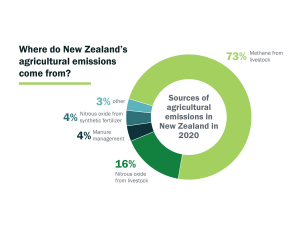The politics of climate change
OPINION: The Financial Times, a major international newspaper, featured New Zealand on its front page at the beginning of June. It wasn't for the right reasons.
 The two main gases that make up NZ agriculture's GHG profile are livestock emissions at 73% of total agriculture and nitrous oxide, which accounts for 16%.
The two main gases that make up NZ agriculture's GHG profile are livestock emissions at 73% of total agriculture and nitrous oxide, which accounts for 16%.
Despite the challenge of agricultural emissions making up 50% of NZ’s total greenhouse gas (GHG) profile, there are several mitigation options in the pipeline.
At the recent Red Meat Sector Conference in Christchurch, Sinead Leahy – principal science advisor at the NZ Agricultural Greenhouse Gas Research Centre (NZAGRC) – outlined some of these developments and work being done in this space.
She told the audience that under the United Nations’ Paris Agreement, NZ has committed to reduce its emissions to 50% below 2005 levels by 2030.
“When you look at NZ’s emissions profile there are two sectors Developments coming to help reduce on-farm GHGs that stand out where reductions can be made – the transport sector and the agriculture sector.”
Leahy explained that the two main gases that made up NZ agriculture’s GHG profile were livestock emissions in the form of methane (burping), accounting for 73% of total agriculture emissions, and nitrous oxide (urine), which accounts for 16%.
In regard to mitigation, she says there are three ways that the sector can reduce agricultural emissions:
Leahy outlined some of these new technologies, which included things such as low emitting sheep and cattle, methane vaccines – as well as methane inhibitors and feed additives.
She says low emitting sheep were well advanced with these genetics starting to be introduced into breeding flocks around the country. Meanwhile, she added that low emitting cattle were a little further behind and these genetics were still probably about 5 years away from introduction into herds.
Leahy says methane inhibitors are an exciting development, with the emergence of products such as Bovear that is placed in animal feed and reduces methane production.
“It has been found that in every mouthful of feed with this product added you get about a 30% decrease in methane emissions with no adverse effects on production.”
However, she says the problem with this product in the NZ situation is that it has a short life and its effects only last about two hours after it is put into feed.
“We have the additional challenge in NZ about how we make this compound useful in our pastoral grazing systems.”
Leahy says there is a lot of work being done into how it could be used outdoors in paddocks via feeders, and this entailed developing it into a slow release format that could last up to eight hours.
“You may not get the same reductions in methane as the indoor format, but you will still get some reductions.”
Another development is a methane vaccine that aims for a 30% reduction in animal methane production.
Leahy says the advantage of a vaccine is it’s a low frequency intervention that is applicable to NZ’s pastoral farming systems and that vaccination is an accepted farm practice in NZ. She adds that the vaccine is also applicable across all types of farmed ruminants, it is auditable and leaves no residues.
She also mentions some of the work being done around low emissions feed and feed additives: “Approximately 21g of methane is produced for every kilogram of feed eaten by a forage-fed animal.”
However, she says the emergence of low emissions feeds – such as low N feeds, maize, forage rape, fodder beet, plantain and GM plants – will help reduce animal methane output.
Similarly, feed additives like oils, garlic, yeasts, direct fed microbials and red seaweed are all being trialed to reduce livestock methane production.
Environment Southland is welcoming this week’s decision by the Environmental Protection Authority (EPA) to approve the release of Blaptea elguetai, a leaf‑feeding beetle that will help control the highly invasive Chilean flame creeper.
This March, the potato industry is proudly celebrating International Women’s Day on 8 March alongside the International Year of the Woman Farmer, recognising the vital role women play across every part of the sector — from paddocks and packhouses to research, leadership, and innovation.
Fruit trader Seeka posted a record profit and returns to shareholders in 2025.
Recent weather events in the Bay of Plenty, Gisborne/Tairawhiti, and Canterbury have been declared a medium-scale adverse event.
DairyNZ's chief executive Campbell Parker says the 2024/25 dairy season reinforces the importance of the dairy sector to New Zealand.
A New Zealand agribusiness helping to turn a long-standing animal welfare and waste issue into a high-value protein stream has won the Australian dairy sector's top innovator award.

OPINION: A mate of yours truly reckons rural Manawatu families are the latest to suffer under what he calls the…
OPINION: If old Winston Peters thinks building trade relations with new nations, such as India, isn't a necessary investment in…